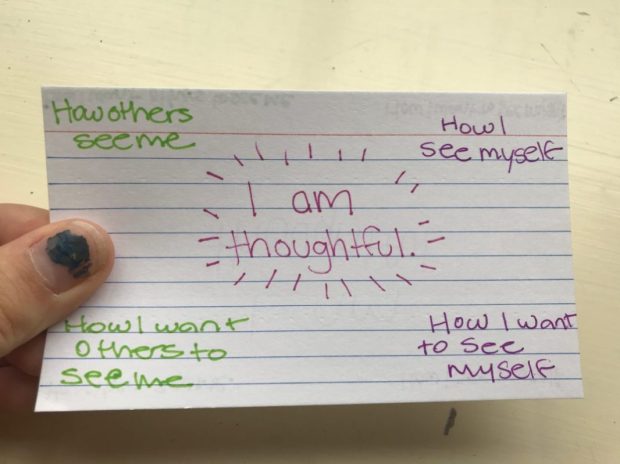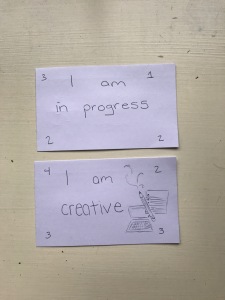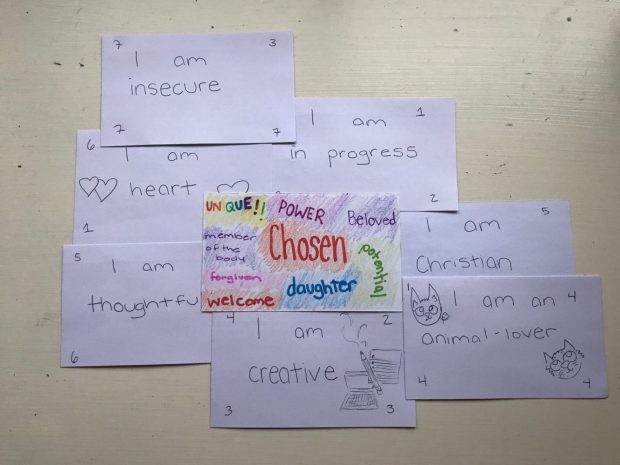Being Real: Self Reflection
Written by Julia Breidenbach
As a volunteer for The Aurora Center, I am expected to attend monthly volunteer meetings. The meetings are supposed to bring us together, remind ourselves that we are a connected team, a working community. Last Saturday, we had a self-reflection exercise. Jerie, our volunteer coordinator, sat in front of the semi-filled classroom, grinning softly as we bumbled around finding seats, shoving the provided bagels in our sleepy morning mouths.
Today, Jerie alerted us we were going to do a self-reflection exercise.
I encourage you to do this exercise as well. It was a meaningful practice for me, even on a Saturday morning (when I should be in bed, thank you very much), and I am sure it could be an enriching experience for you.
- Get seven notecards.
- On each one, write down the prompt “I am…”
- Choose one or two words to follow this phrase. These words can be traits, duties, roles, whatever feels right for you.
- On the upper right hand corner of each notecard, rank (1-7) the words that you see yourself most often as.
- On the lower right hand corner, rank each card by how you most want to see yourself.
- On the upper left hand corner, rank each card by what you think others see in you most often.
- On the bottom left hand corner, rank each card by what you want others to see in you most.
- Reflect. Did most traits get the same score? Which ones differed? Which ones did not?
There isn’t necessarily a definable “good” or “bad” with having matched or mismatched scores. However, this exercise allows you to think critically about what parts of yourself you’re pushing down or allowing yourself and others to see.
This exercise reminded me a bit of the story of Moses. Being a Hebrew in a time when Hebrews were persecuted and enslaved most likely led for a complex self-identity. Had it not been for a stroke of seemingly random luck (the Pharaoh’s daughter finding and adopting him), he would not have survived even infanthood.
As an adult, Moses probably tried to push down the aspects of himself that made for a difficult childhood; the possible confusion about why he was chosen to survive when so many others did not, his disconcerting closeness to death as a child, and what his responsibility was in stopping violence against Hebrew slaves. As Pastor Kate mentioned in her sermon two weeks ago, seeing his Hebrew brothers and sisters suffering while living in the house of their persecutor must have been extremely confusing and painful.
Years later, an adult was living a simple life as a farmer, drifting away from the confusing self-identity of his youth, when God showed him a burning bush and brought all the pain back. God let Moses see, once again, his bizarre position of growing up next to (and most likely learning from) successful leaders, but also having great sympathy for the enslaved Israelites. God showed Moses that the most painful, messy parts of his identity also gave him the most potential. God called Moses to lead his people out of hell on Earth, and after a bit of complaining, Moses agreed.
I see this same paradox occurring with my least favorite notecard “I am insecure.” While it was a trait I highly identified with, I least wanted others and me to see my insecurity. Obviously, I have some work to do.
My insecurity, though problematic, has strengthened my ability to be an advocate for Aurora. I am able to meet a client where they are at, listen with an open heart, and not shove advice on a client; the understanding that I don’t know what is best for someone else feels very natural to me. Also, I am willing to change my strategy if they need different things from me when they make a call; I am not so concrete in my style that I am resistant to change. Owning that I am insecure about what I am saying and how I am presenting myself allows me show my own vulnerability and awkwardness with the client. If I am not being my true self, how can I make space for a client to feel comfortable sharing the worst experience of their lives?
Whether you felt empowered by your chosen traits or disappointed by them, God created you with a purpose in mind. Good, bad, congruent, or mismatched, I believe all of us is formed with God’s knowing hands. Moses sees his speech impediment, God sees potential for an advocate and leader; I see my insecurity, and God sees my open-heartedness. If God were to write you a notecard, what would it say?



